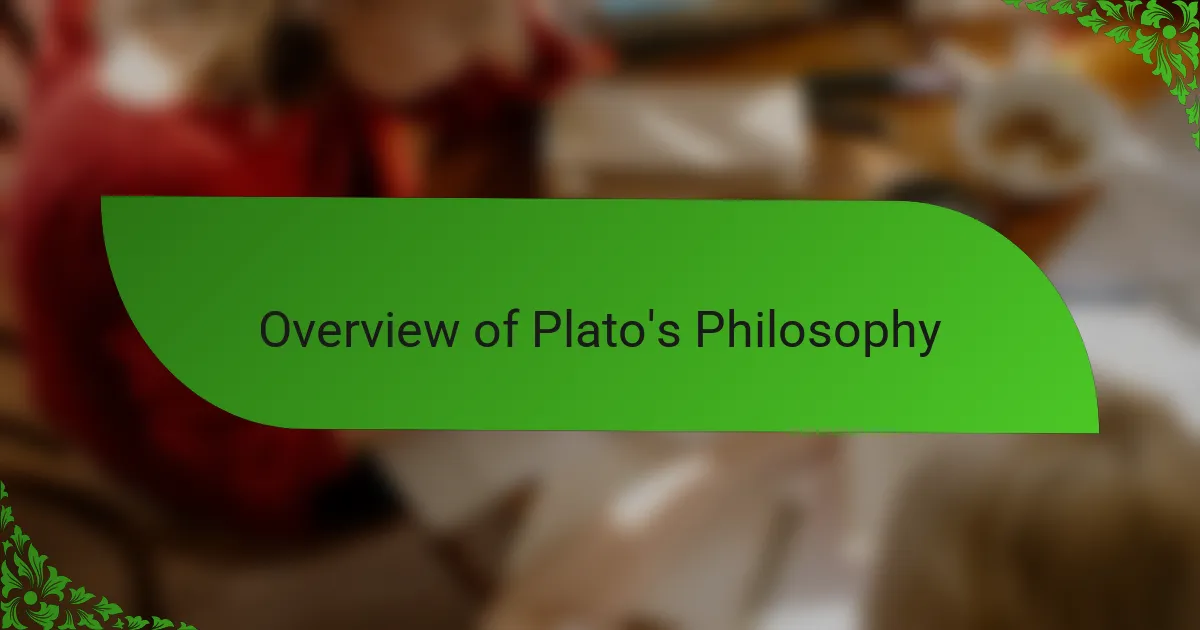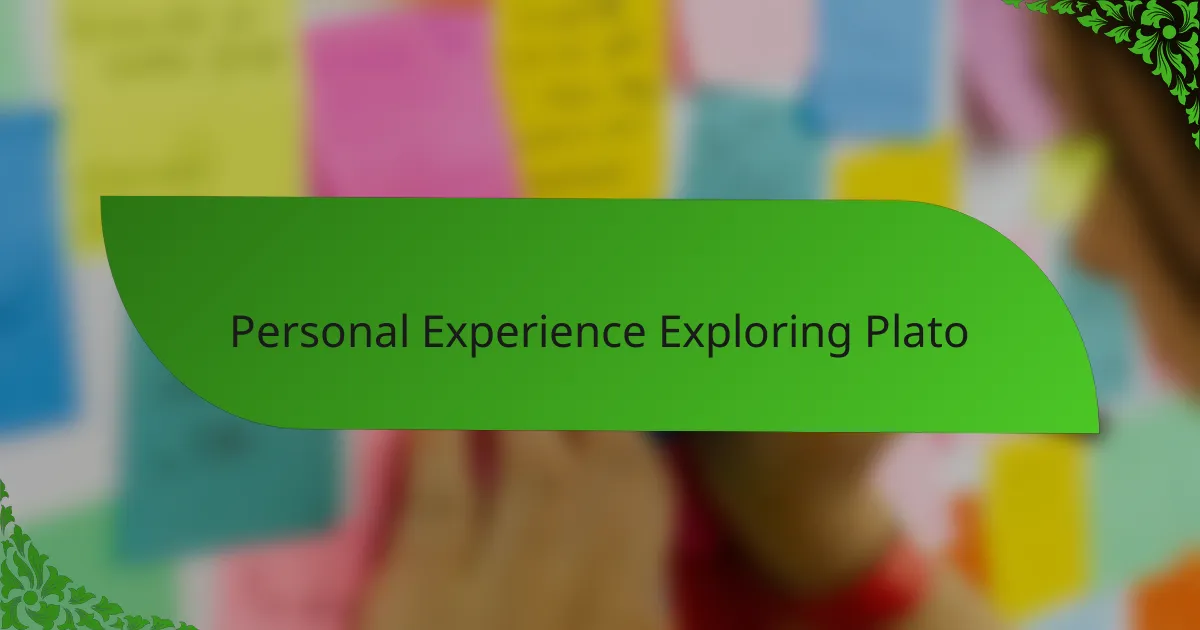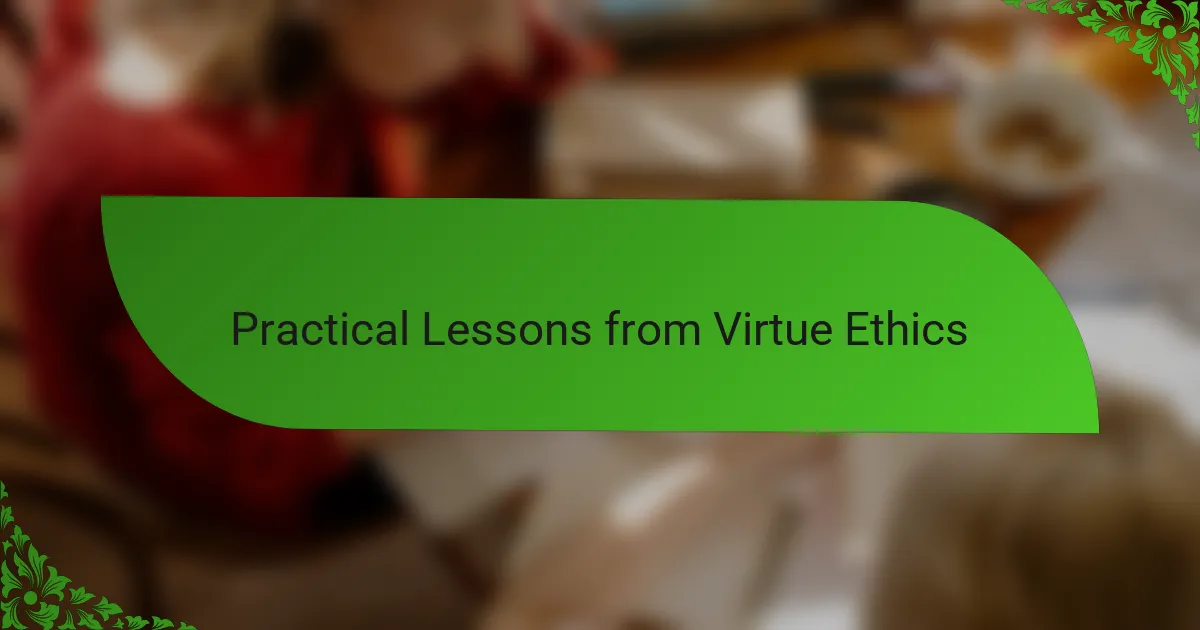Key takeaways
- Virtue ethics emphasizes character development over strict adherence to rules, encouraging ongoing self-reflection and personal growth.
- Plato’s philosophy highlights the importance of cultivating virtues as habits, fostering harmony within oneself and discerning true goodness.
- In education, integrating virtue ethics can create a more meaningful learning environment, where character and personal development are prioritized over mere academic success.
- Teachers must model virtues they wish to instill in students, showcasing authenticity and commitment to personal and collective growth.

Understanding Virtue Ethics Concepts
When I first encountered virtue ethics, I was struck by its focus on character rather than rules. It made me wonder: what does it really mean to be a good person? This question led me to explore how virtues like courage and wisdom shape our actions over time.
Plato’s approach helped me see virtues as habits we cultivate, not just lofty ideals. I remember contemplating how his idea of the “just soul” suggests harmony within ourselves mirrors the balance we seek in everyday life. Have you ever noticed how certain qualities naturally guide your decisions?
Understanding virtue ethics became a journey of self-reflection for me. It wasn’t just about learning concepts; it was about asking, “Am I becoming the person I want to be?” This personal connection is what makes virtue ethics so powerful and enduring.

Overview of Plato’s Philosophy
Plato’s philosophy fascinated me from the start because it digs deep into the nature of reality and knowledge. He believed that beyond our everyday experience, there exists a world of perfect forms—ideal versions of concepts like beauty or justice. It made me think: if these perfect forms exist, how do we grasp what’s truly good or virtuous here on earth?
What really stayed with me was Plato’s idea of the soul being divided into parts, each with its own desires and roles. His vision of the “just soul” as a harmonious balance reminded me of times when I felt conflicted inside, struggling to align my emotions and reason. Doesn’t that inner struggle feel so relatable?
Exploring Plato helped me see philosophy not just as abstract thought but as a guide for living well. His belief in reason leading us toward truth and virtue sparked a realization: cultivating wisdom isn’t some distant goal; it’s an ongoing process that shapes who we are every day. Have you noticed how learning sometimes changes the way you see yourself? I certainly have.

Applying Virtue Ethics in Education
Applying virtue ethics in education means shifting the focus from merely transmitting facts to nurturing good character. I’ve found that when educators encourage students to practice virtues like honesty or perseverance, learning becomes more meaningful than just passing exams. Have you ever seen how a student’s confidence grows when they realize that being courageous in their learning helps them overcome challenges?
In my experience, creating a classroom environment where virtues are modeled and rewarded feels more authentic. It’s about cultivating habits, like Plato suggested, rather than enforcing rigid rules. I remember a time when a teacher praised a small act of kindness, and suddenly, it sparked a ripple effect of goodwill among the students—proving how powerful habit formation can be.
This approach also asks educators to reflect on their own character. I’ve often wondered, how can I guide students toward virtue if I’m not striving for it myself? It’s a challenging but rewarding journey, one where teaching and learning become intertwined in a shared pursuit of becoming better people. Isn’t that a purpose worth aspiring to in education?

Personal Experience Exploring Plato
Diving into Plato’s dialogues felt like entering a conversation that spanned centuries. I recall reading The Republic and being captivated by the way Plato’s characters wrestled with questions of justice and virtue—it was almost as if I was eavesdropping on a timeless debate. Have you ever encountered a text that feels less like reading and more like a dialogue with a wise friend?
One moment that stood out was grappling with the allegory of the cave. It wasn’t just a story; it hit me personally about how often I might mistake shadows for reality in my own judgments. This realization sparked a deeper curiosity: how can I develop the clarity and courage to seek truth beyond my own limited perspective?
Exploring Plato made me aware of the practical side of philosophy. It wasn’t just about ideas in the abstract—his vision of the virtuous soul challenged me to observe my own habits and choices more closely. Have you ever noticed how reflecting on your character leads to small but meaningful changes in how you act day to day? That’s the kind of insight Plato inspired in me.

Practical Lessons from Virtue Ethics
Living out virtue ethics, as I’ve come to understand through Plato, means paying attention to the small choices that build character over time. I recall a moment when I chose patience instead of frustration during a stressful situation; it wasn’t dramatic, but it felt like a step toward becoming more balanced inside. Have you noticed how these everyday decisions quietly shape who you become?
Another lesson I’ve taken to heart is the idea that virtues aren’t isolated traits but parts of a whole—like pieces of a well-tuned instrument. When I focus too much on one virtue, say courage, without tempering it with wisdom or temperance, things can go awry. Doesn’t that remind you of times when good intentions alone weren’t enough?
What strikes me most practically is how virtue ethics invites ongoing self-reflection rather than quick fixes. I often ask myself, “Am I cultivating harmony within?” and that question nudges me toward growth rather than perfection. This gentle, continuous striving feels both challenging and deeply human, don’t you think?

Integrating Virtue Ethics in Teaching
Integrating virtue ethics into teaching has challenged me to think beyond lesson plans and grades. I’ve noticed that when I encourage students to embody virtues like patience or kindness, the classroom atmosphere shifts—learning becomes a shared journey of growth rather than a checklist of tasks. Have you ever seen how a simple act of empathy between students can change the dynamic in a way facts alone never could?
I remember a time when I incorporated discussions about courage in decision-making during a class project. Watching students wrestle with real-life dilemmas made me realize that teaching virtues means offering opportunities to practice them, not just understand them intellectually. It’s this hands-on experience that, in my opinion, truly cultivates character.
At the same time, I’ve come to see that teachers must model the virtues they want to inspire. Reflecting on my own habits—whether it’s showing humility when I don’t have all the answers or demonstrating perseverance amid challenges—has made me more authentic as an educator. After all, isn’t learning about virtue most powerful when it’s lived, not just taught?